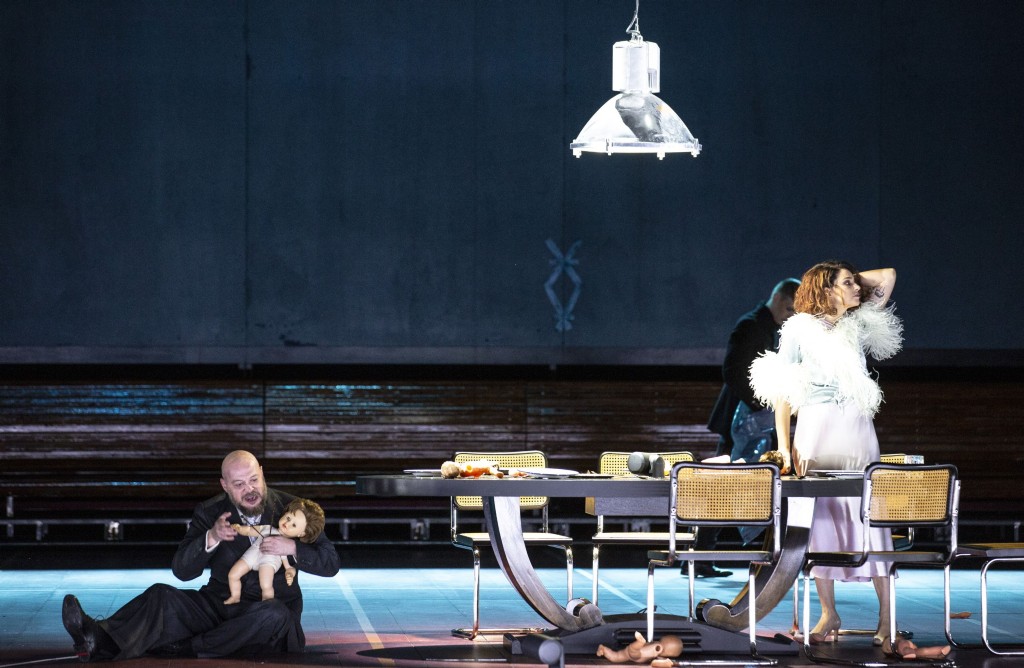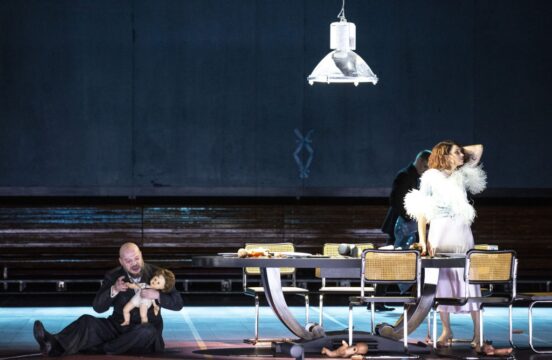Macbeth and Verdi
The first version of Macbeth, debuted at Teatro della Pergola in Florence on March 14, 1847, can be seen as a “youthful opera” from the composer, coming five years after Nabucco (1842). It was Verdi's maiden foray into adapting Shakespeare's work, a playwright he would revisit towards the end of his career with the prodigious pieces Otello and Falstaff. A second version of Macbeth was introduced by Verdi in Paris at the Théâtre Lyrique on April 19, 1865, marked by a profound revision of the original score. As he famously penned in a letter, Verdi yearned for an “ugly voice” to embody Lady Macbeth. Despite the first singer having a beautiful voice, Verdi emphasized this requirement due to the character's psychology. Initially, he rejected the renowned singer Eugenia Tadolini, who had earlier brought characters from Donizetti's Linda di Chamounix and Maria di Rohan to life (as well as Verdi's Ernani and Alzira), due to the “angelic” quality of her voice, which he found contradictory to the portrayal of the monstrous Shakespearean Lady.
Director Krzysztof Warlikowski's Production at the Salzburg Festival
In his 30-year career, Polish director Krzysztof Warlikowski has staged numerous plays and operas. Since 1997, he's explored the peaks of Shakespeare's works, including Hamlet (notably at the Avignon Festival in 2001), The Taming of the Shrew, Twelfth Night, The Tempest, and Macbeth. Warlikowski was honored with a Golden Lion in Venice in 2021, recognizing his lifelong contributions to both theatre and opera(1).
Stage Design
The stage paints the image of a gruesome and bloody nightmare, crafted through the decor and costumes of Malgorzata Szczesniak, lighting from Felice Ross, and video contributions by Denis Guéguin and Kamil Polak. There's a singular setting throughout: the space is devoid of any witches' lair, the Macbeths' chamber, or any parts of a royal castle. The vast stage of the Grand Festival Hall lies bare, occasionally transforming into a waiting area, clinic, ballroom, dining hall, or other spaces(2). This chilling, oversized area is anchored by a massive bench, where, even before the musical prologue, Macbeth and Lady Macbeth sit apart, as a couple with nothing left to say, both anxious about their uncertain future. Above the stage, there’s a narrow glass gallery, and to one side, a washbasin where Lady Macbeth will later wash her blood-stained hands post King Duncan's assassination and eventually slit her wrists in a tragic suicide. A massive, frightening semicircle of radiant light descends during the palace festivities.
Key Themes
.Infertility: This stands out as the core theme, focusing on Lady Macbeth's inability to bear children. A pantomime gynecologist confirms this in the opening, paralleled with Macbeth and Banco consulting the witches on the respective futures (blind witches wearing dark glasses). Simultaneously, Lady Macbeth undergoes a gynecological exam, leading to the revelation of her infertility. Through dramatic stage visuals and close-ups, Asmik Grigorian's(3)(Lady Macbeth) face intensely showcases hope, fear, disillusionment, and devastation.
.Renunciation: This stems from the preceding theme, highlighting Macbeth's inability to pass down the crown to his heirs, as Banco's lineage is destined to reign. This corresponds to Lady Macbeth's infertility. Their collective resignations foster a compelling death drive, pushing them to eliminate anything and anyone fertile or threatening their power in a relentless pursuit of it.
.Fascism and Brutal Violence: The narrative unfolds in the 1930s, an era marred by fascism in Italy and the rise of Nazism in Germany. The story is shifted from medieval times to the early 20th century. Yet, the themes of ambition, power-lust, violence, murderous insanity, and cruelty are timeless and universal. Warlikowski's depiction delves deep into the complex human psyche, drawing inspiration from the likes of Bernardo Bertolucci's film, The Conformist, (with Jean-Louis Trintignant and Dominique Sanda) where cold-blooded murders, committed in the name of fascism, are depicted.
.Pervading presence of children: The play is riddled with child motifs, from the projected image of a baby in the prologue to young children symbolizing hope and freedom towards the end. In one notable scene, as Scottish exiles lament their lost homeland, a multitude of young children, dressed in white, partake in a chilling sequence that mimics the Biblical Massacre of the Innocents and the tragic demise of the Goebbels children during WWII.
The performance at the Grosses Festspielhaus in Salzburg
-Philippe Jordan, standing in for an ailing Franz Welser-Möst, took up the conductor's baton. He achieved a harmonious balance between the grandeur and velocity of the musical narrative. Under his powerful and sharp direction, the splendid Vienna Philharmonic Orchestra was awe-inspiring in its beauty, precision, and sound.
-The Vienna State Opera Choir matched this standard. In the opulent scene celebrating King Duncan's funeral with all the courtiers, this outstanding ensemble – one of the most renowned in the operatic world – showcased the magnificent voices that make it up, which combined for the concertato ("Schiudi inferno") that concludes the first act with the wonderful voices of the leading roles, atop which soared the brilliant high notes of Asmik Grigorian.
-Indeed, Asmik Grigorian's from the first notes ("Ambizioso spirto, tu sei Macbetto"), it was clear that the Lithuanian soprano had the vocal prowess to fill the vast Festspielhaus, exhibiting a flawless throughout the demanding role with an impressive and extensive vocal range . From the fiery cabaletta that follows ("Or tutti sorgete, ministri infernali") to the mind blowing sleepwalking scene in the fourth act where the heroine teeters on the edge of madness, every moment is captivating both vocally and in terms of dramatic interpretation. "La luce langue" – composed for the Paris version – further illustrates her unmatched ability to give meaning to every word and sentiment. A mesmerizing sequence where Lady Macbeth converses with a colossal mirror, demonstrating an absolute control in singing accentuated by the exceptional directorial touch of Krzysztof Warlikowski. Not a second passes where the singer isn't wholly invested in her performance, making it an incredible theater experience. .
-With a robust voice, the baritone Vladislav Sulimsky from Belarus embodies a wavering Macbeth, often indecisive and seldom resolute, overshadowed by a charismatic wife. His majestic and sensuous voice, which can turn rugged when expressing anger, aptly conveys the diverse emotional shades Verdi assigned to the role. He and his co-star perfectly execute the gripping sequences surrounding King Duncan's assassination, both, much like the orchestra, beautifully capturing the whispered undertones. It's worth noting that in the final scene, the baritone sings the 1847 aria: "Mal per me che m'affidai" (omitted in the revised 1865 Paris version).
– Chilean Jonathan Tetelman's (Macduff) valience is evident from the moment he discovers the slain king. Here's a tenor with a powerful voice and biting accents ("O figli, o figli miei") who can also admirably highlight his legato in the lament for his lost children ("Ah, la paterna mano"), earning him warm applause.
-German singer Tareq Nazmi (born in Kuwait) portrays Banco. It's a pity the role isn't more extended, as this endearing performer boasts a magnificent bass timbre. His commanding voice remains consistently even-toned, maintaining its color and quality across registers – a rarity for such vocal ranges.
– Of course, in such a festival, the quality of "secondary" roles (which in other settings might well be "lead" roles) must be acknowledged, especially the bright American tenor Evan Leroy Johnson as Malcolm, along with Aleksei Kulagin (the doctor) and Caterina Piva (Lady Macbeth's attendant).
– The six performances of Macbeth (from July 29 to August 24) were sold out. Hence, spectators couldn't hope for last-minute tickets. The audience during the performance we attended was particularly attentive, mainly reserving their hearty applause for the final bows. First appearing alone on stage, the duo Asmik Grigorian and Vladislav Sulimsky received a genuine triumph, marked by prolonged ovations. Enthusiastic acclaim was also bestowed upon the other performers, and conductor Philippe Jordan, the Vienna Philharmonic Orchestra, and the Vienna State Opera Chorus received well-deserved applause.
Here's to hoping this legendary Macbeth performance, much like last year's Il Trittico by Puccini, will get a DVD release.
Christian Jarniat
August 14, 2023
Traduit en anglais par Cécile Day
(1) Krzysztof Warlikowski recently directed another opera inspired by Shakespeare's works at the Paris Opera: Hamlet featuring Ludovic Tézier and Lisette Oropesa. Again, a work where madness is pushed to its extremes.
(2) Inspired by the Jeu de Paume Hall in the Tuileries in Paris.
(3) Over recent years, Asmik Grigorian has emerged as an indispensable star of the Salzburg Festival, with roles like Salomé in 2018, Chrysothemis in Elektra in 2021, and all three female parts in Puccini's Trittico in 2023.



